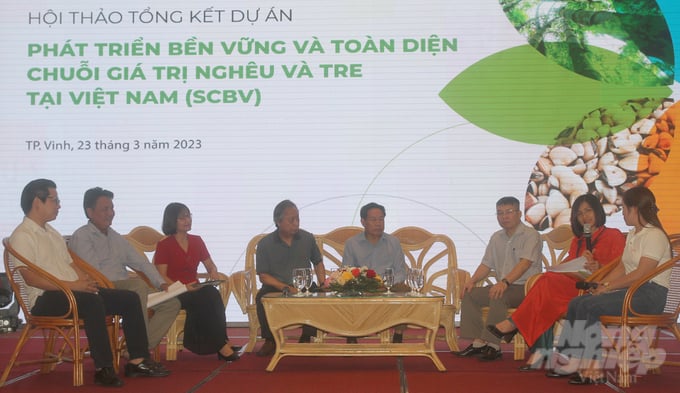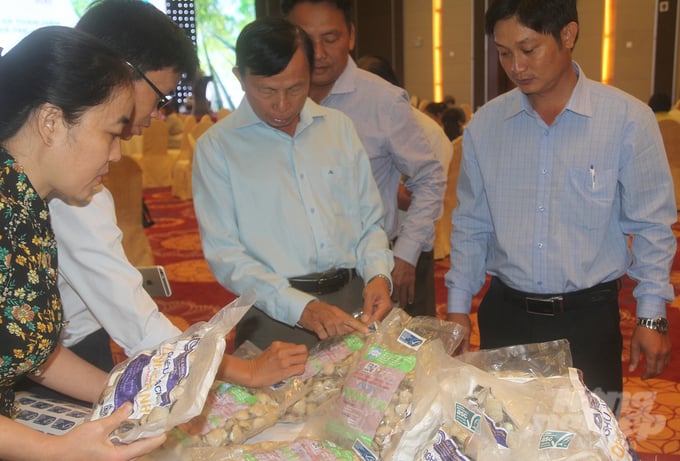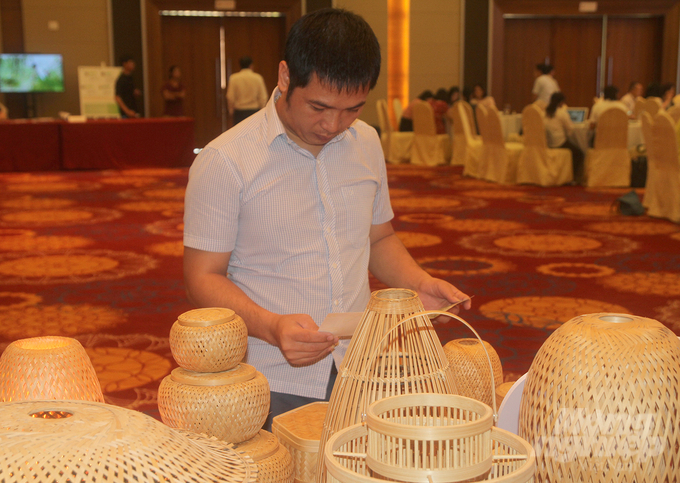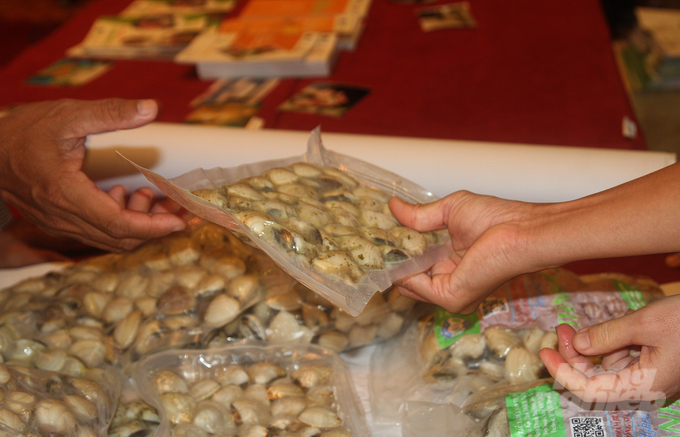November 26, 2025 | 02:22 GMT +7
November 26, 2025 | 02:22 GMT +7
Hotline: 0913.378.918
November 26, 2025 | 02:22 GMT +7
Hotline: 0913.378.918

The project on Sustainable clam and bamboo value chain development in Vietnam (SCBV) has achieved remarkable results after 5 years. Photo: Viet Khanh.
A summary workshop for the Project on "Sustainable clam and bamboo value chain development in Vietnam" was held on March 23 in Nghe An. The project is funded by the European Union for a total capital of 4.3 million Euros. It was implemented in the five provinces of Nghe An, Thanh Hoa, Tien Giang, Tra Vinh and Ben Tre.
The project was the joint effort of Oxfam Vietnam and the Research Center for Non-timber Forest Products under the Vietnamese Academy of Forest Sciences - Ministry of Agriculture and Rural Development, the International Collaborating Centre for Aquaculture and Fisheries Sustainability, and the Vietnam Chamber of Commerce and Industry (VCCI).
The project was implemented for 5 years between 2018 and 2023. Consequently, the value chain of clam and bamboo in Vietnam has observed remarkable and positive transformations.

The clam and bamboo value chain has been distinctly enhanced. Photo: Quoc Toan.
According to the review and assessment conducted in 2018, approximately 1.5 million small-scale producers in Vietnam acquired a livelihood from the production and processing of clams and bamboo. Due to overexploitation and a lack of necessary care, the essential bamboo material area at the time experienced poverty and degradation. On the other hand, clam fields were shrinking and distributed further away from shore. This trend was especially noticable in the 3 provinces of Tra Vinh, Tien Giang and Ben Tre.
Small and medium-sized processing businesses found themselves in a challenging situation due to limitations in terms of scale, technology, raw materials, and a lack of an output market. Despite being export bridges, large companies lack direct connections with production areas so the source of input materials is unreliable.
With sustainable standards as its direction for development, the Project on "Sustainable clam and bamboo value chain development in Vietnam" has collaborated with provinces across the country to improve technology for farmers and subsequently achieve international certificates such as MSC (Marine Stewardship Council) and ASC (Aquaculture Stewardship Council) for clams, and FSC (Forest Stewardship Council) for bamboo.

The project has improved farmers' capacity to produce high standard clam products. Photo: Viet Khanh.
These certificates act as passports to bring Vietnamese products to major markets including the US, Europe, Japan, etc. Moreover, they help preserve sustainable clam and bamboo material areas, thereby minimizing adverse environmental and social impacts.
Immediately after entering operation, the project has helped Quan Hoa district in Thanh Hoa province to be the first locality in Vietnam to receive the FSC certificate for bamboo products in 2019, followed by Que Phong districts in Nghe An province and Quan Son district in Thanh Hoa province.
Tra Vinh province officially became the third clam farming area in the world to receive the ASC certificate in early 2023. These achievements demonstrated the great progress that Vietnam's clam and bamboo industries have made over the past five years.
Mr. Phan Van Thang, Director of the Research Center for Non-timber Forest Products, commented: “Bamboo forests developed poorly in the past; the trunks were small and degraded. After bamboo forests are assigned to the care of the community and households, people have properly applied the process of protecting, caring, nurturing, restoring, and sustainable exploitation. Consequently, bamboo forests grow stronger with higher productivity, more uniform quality, thereby bringing much higher economic, social and environmental values”.

Consumers enjoy the quality and design of bamboo products in the project areas. Photo: Viet Khanh.
In addition to innovative production techniques, a prerequisite for the effective operation of the value chain is the capacity of chain management. This is achieved through group production organization or cooperative model instead of individual households. The goal is to innovate management thinking, and strengthen the connection between businesses and cooperatives/groups based on cooperation agreements in production and trading according to sustainable standards.
Mr. Hoang Quang Phong, Vice President of the Vietnam Chamber of Commerce and Industry shared: “The project has prompted businesses to develop continuously, cooperate harmoniously with stakeholders to promote the value chain. The model and sustainable production standards will help open the door to difficult export markets.”

Thanks to the project, Vietnamese clams are ready to reach out to fastidious markets around the world. Photo: Quoc Toan.
Ms. Vu Thi Quynh Hoa, Country Director of Oxfam Vietnam emphasized: “Creating a comprehensive value chain and strengthening chain management capacity include more than just raising each link's income; they also entail ensuring that the value chain is equitably organized and that all stakeholders share the advantages and risks. That is the motivation for stakeholders to promote their role as the subject of sustainable production, natural resources conservation and social benefits for the community.”
Two years of the Covid-19 pandemic has significantly affected the project's progress as well as the markets and other production factors. Regardless, the project still achieved outstanding results: more than 34,000 people are given access to a more sustainable income; 125 production groups are better organized; 63 businesses benefit from improved production and trading, increased added value and inclusive business policies; more than 4,000 employment opportunities are created; Vietnam's clam exports to the Europe increased by 38 to 40%, bamboo exports increased by 42%.
Translated by Nguyen Hai Long
/2025/11/24/3536-2-112800_176.jpg)
(VAN) Dong Nai now has tens of thousands of hectares of forests certified for sustainable management, and this area will continue to be expanded in the coming period.

(VAN) Vinh Ha hamlet (Dai Xuyen commune, Hanoi) is shifting away from small-scale farming as households adopt bioscurity into their breeder chicken models.

(VAN) Heavy rains make aquatic species more vulnerable to disease. Proactive water management and high-tech systems help farmers prevent outbreaks and protect yields.

(VAN) Greenhouses are shifting production mindsets in Binh Lu commune, enabling farmers to ‘weather the sun and rain’ and secure stable vegetable harvests throughout the year.

(VAN) Green transition is crucial for the Mekong Delta amid climate change and stricter standards, offering a path toward sustainability.

(VAN) Dong Thap promotes agricultural restructuring, forms large specialized farming zones, raises the value of agricultural products and develops toward ecological and high-tech directions.
/2025/11/22/4018-4-213342_747.jpg)
(VAN) The Mekong Delta Agricultural Experts Club has attracted 143 experts and researchers to participate in providing consultancy and contributing initiatives to the development of one million hectares of high-quality rice.